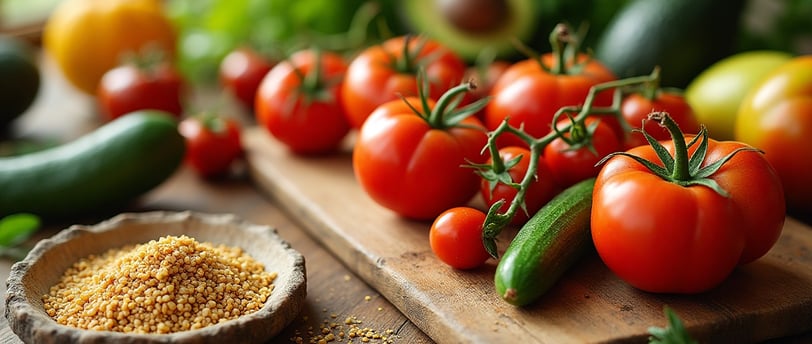Plant Based Diet","Categories:","Flavorful Recipes, Health Benefits, Global Cuisine, Cooking Tips, Ingredient Spotlight
Join the plant-based revolution and uncover flavorful recipes, health benefits, and global cuisine secrets that will transform your culinary adventures.
RECIPESNUTRITIOUS MEALMEALPLANT-BASED KETOHEALTH
5/22/20255 min read


If you're curious about exploring the world of plant-based diets, you're not alone. These diets offer a wealth of flavorful recipes and a host of health benefits. From the spices of Indian curries to the zest of South American quinoa salads, you'll discover how rich and satisfying plant-based meals can be. With essential cooking tips and an ingredient spotlight, you'll find transitioning to this lifestyle both rewarding and enjoyable. Let's uncover more about this nutritious journey.
Key Takeaways
Plant-based diets support heart health and weight management with nutrient-dense foods.
Global cuisines offer exciting plant-based recipes, such as Indian curries and African stews.
Essential ingredients include legumes, tofu, nutritional yeast, and spices like cumin.
Transition gradually by replacing meat with plant-based proteins in familiar dishes.
Meal planning ensures nutritional balance and prevents impulsive eating habits.
Exploring the Basics of Plant-Based Eating
Whether you're curious about adopting a plant-based diet or simply want to incorporate more plant foods into your meals, understanding the basics is a great starting point.
The roots of plant-based eating can be traced back to various cultures throughout history. For instance, many Asian and Mediterranean diets have long emphasized plant foods. Knowing this, you can appreciate its global significance.
Achieving nutritional balance is crucial. Focus on incorporating a variety of fruits, vegetables, grains, and legumes to meet your nutritional needs. Each group provides essential nutrients like fiber, vitamins, and minerals.
Additionally, including a source of plant-based protein, such as tofu or lentils, ensures you get adequate protein intake. With these foundational elements, you can confidently explore plant-based eating.
Health Benefits of a Plant-Based Diet
Understanding the basics of plant-based eating sets the stage for appreciating its numerous health benefits. By focusing on nutrient-dense foods like fruits, vegetables, whole grains, and legumes, you're supporting heart health and promoting effective weight management.
Studies show that plant-based diets can lower blood pressure and cholesterol levels, reducing the risk of heart disease. Your digestive health also improves, as fiber-rich foods aid digestion and prevent constipation.
Moreover, adopting a plant-based diet positively impacts the environment by reducing your carbon footprint and conserving natural resources.
The longevity benefits are significant, too; populations with plant-heavy diets often enjoy longer lifespans and lower rates of chronic diseases. By embracing this lifestyle, you're prioritizing your health and the planet's well-being.
Flavorful Plant-Based Recipes From Around the World
Exploring the world of plant-based cuisine introduces you to a rich tapestry of global flavors and culinary traditions. You’ll find that spicy curries from India aren't only vibrant but also packed with nutrients, thanks to ingredients like turmeric and lentils. These curries offer a depth of flavor that’s both satisfying and healthful.
Shift your focus to Africa, where hearty stews made with beans and vegetables are a staple. These stews provide a comforting, protein-rich meal that’s simple to prepare.
South America offers its own delights with dishes like quinoa salads, which are refreshing and nutrient-dense. Each region presents a unique way to enjoy plant-based foods, making your culinary journey both exciting and beneficial for your health.
Essential Ingredients for Plant-Based Cooking
To truly enjoy the diverse flavors of plant-based cuisine, you need to stock your kitchen with some key ingredients that are both versatile and nutritious.
Start with essential spices like cumin, turmeric, and smoked paprika to add depth to your dishes. For protein sources, include legumes, tofu, and tempeh, which are excellent meat alternatives.
Opt for healthy cooking oils like olive and avocado to enhance flavor and ensure proper cooking. Don’t forget flavor enhancers such as nutritional yeast and miso, which add umami richness.
Keep pantry staples on hand, like whole grains and nuts, for quick meal preparation. Lastly, incorporate seasonal vegetables to ensure freshness and maximize nutritional benefits.
This well-rounded collection supports a flavorful plant-based diet.
Tips for Transitioning to a Plant-Based Lifestyle
Although adopting a plant-based lifestyle may seem daunting at first, with the right strategies, you can make a smooth transition.
Start by incorporating meal planning into your routine. Allocate time each week to decide on your meals, ensuring they're balanced and diverse. This reduces impulsive eating and keeps you on track.
Explore snack alternatives like roasted chickpeas or nut butter with fruit, which are satisfying and nutritious. Gradually replace meat with plant-based proteins like lentils or quinoa in your favorite dishes.
Educate yourself on essential nutrients like protein, iron, and vitamin B12, ensuring you're consuming them adequately. Engage with online communities for support and inspiration.
Mastering Plant-Based Cooking Techniques
When diving into plant-based cooking, mastering the right techniques can elevate your culinary skills and nutritional intake.
Start with sautéing techniques, which are essential for bringing out the natural flavors in vegetables. Use a small amount of plant-based oil or broth to prevent sticking and enhance taste. Heat your pan before adding ingredients to ensure even cooking and maintain texture.
Flavor balancing is another crucial skill. Achieving the right mix of sweet, salty, sour, and umami can transform a simple dish into a gourmet experience.
For instance, add a splash of lemon juice to brighten flavors or a pinch of salt to highlight sweetness in roasted vegetables. By mastering these techniques, you’ll create dishes that are both delicious and nutritionally satisfying.
Busting Myths About Plant-Based Nutrition
Why does plant-based nutrition often get misunderstood? It’s partly due to persistent plant based misconceptions and nutritional myths.
One common myth is that you can’t get enough protein from a plant-based diet. In reality, plants like lentils, chickpeas, and quinoa are rich in protein.
Another misconception is that plant-based diets lack essential nutrients like iron and calcium. However, leafy greens, fortified plant milks, and legumes are excellent sources.
Some believe plant-based eating is inherently bland, but diverse global cuisines offer flavorful options.
The myth that such diets are always expensive isn’t true either; planning meals using bulk grains and seasonal produce can be economical.
Incorporating Plant-Based Meals Into Your Daily Routine
Understanding the myths surrounding plant-based nutrition is a helpful step toward incorporating more plant-based meals into your daily routine. Start by embracing meal prepping and recipe planning to streamline your transition. Studies show that preparing meals in advance reduces stress and helps maintain dietary goals.
Begin with simple recipes, gradually increasing complexity as you gain confidence. Allocate a specific day for meal prepping, dedicating a few hours to wash, chop, and store vegetables and grains. This saves time during busy weekdays.
Explore diverse cuisines to keep meals interesting and nutritionally balanced. Utilize apps or meal planners to organize recipes, shopping lists, and weekly menus. By integrating these strategies, you’ll find plant-based eating more accessible and sustainable, boosting both health and satisfaction.
Conclusion
Embracing a plant-based diet not only boosts your health but also lets you explore diverse global flavors. By focusing on essential ingredients and mastering cooking techniques, you can create delicious meals that are both nutritious and satisfying. Transitioning might seem daunting, but with practical tips and a willingness to experiment, you'll find it's easier than expected. Remember, every small step towards plant-based eating contributes to your well-being and helps debunk common myths about plant-based nutrition.
